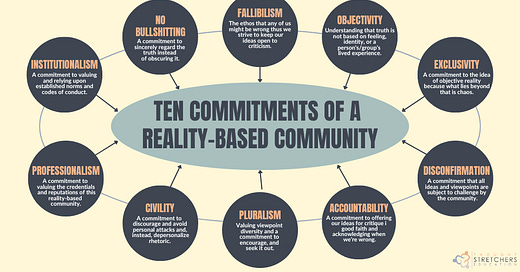Embracing Reality: The Ten Commitments of a Reality-Based Community
K12 education should teach these intellectual liberal principles to help uphold our democracy.
In an age where misinformation and subjective narratives often cloud our understanding of the world, grounding ourselves in reality is more vital than ever.
The left traffics its ‘truths’ like telling us Joe Biden was really at the top of his game toward the end of his presidency (and we’re embracing fascism to say he wasn’t), or that there are no meaningful differences between males and females (and we’re bigoted to even suggest there are).
The right, has their fair share of ‘truths’ led by perhaps the world’s most impressive bullshitter of all time, Donald Trump, who has said for years that he won the 2020 election (and we’re anti-American to say he lost) and most recently, Secretary of Defense and former Fox News journalist, Pete Hegseth claiming that “nobody was texting war plans” (and the claims are just another hoax) despite his own administration’s National Security Council acknowledging the veracity of the journalist who was somehow added to the unsecured text thread.
K12 education has a vital role to play in helping to re-establish and grow the intellectual liberalism that helps support our democracy by encouraging students to value knowledge, truth, and reality and to learn how to ask thoughtful questions, analyze evidence, and consider diverse perspectives. Knowledge-rich inquiry teaching promotes intellectual humility and a deeper understanding of complex issues. This method not only equips students with critical problem-solving skills but also fosters empathy and a willingness to engage with differing viewpoints. As divisiveness grows, inquiry can serve as a powerful tool to bridge ideological divides and strengthen democratic values.
A reality-based community thrives on principles that prioritize truth, integrity, and open discourse. The Ten Commitments of a Reality-Based Community, developed by Jonathan Rauch in his excellent 2021 book, The Constitution of Knowledge: A Defense of Truth, outline a framework for fostering environments where truth and accountability prevail. Here is a brief description of these commitments:
Fallibilism: No one has a monopoly on the truth. Fallibilism is the belief that our ideas and understandings may be flawed. Embracing this ethos encourages us to keep our minds open to criticism and to adjust our views when presented with new evidence.
Objectivity: Truth is not subjective. Objectivity is the understanding that reality exists independently of personal feelings, identities, or lived experiences. A reality-based community acknowledges and seeks truths that transcend individual perspectives.
Exclusivity: This commitment underscores the belief that objective reality is the only path to understanding. Without this grounding, chaos and confusion take hold. Reality is not a matter of opinion—it is a constant that must be recognized and respected.
Disconfirmation: All ideas should be open to challenge. Disconfirmation is the practice of allowing all viewpoints and beliefs to be tested and questioned by the community. This principle ensures that only ideas that withstand scrutiny hold value.
Accountability: Offering ideas for critique and acknowledging mistakes when wrong is a vital part of intellectual honesty. Accountability fosters a culture of continuous improvement and mutual respect.
Pluralism: A thriving reality-based community values diversity of thought. Pluralism encourages the exploration and inclusion of multiple viewpoints, which leads to a richer and more nuanced understanding of reality.
Civility: Respectful dialogue is essential. Civility means avoiding personal attacks and depersonalizing rhetoric. This commitment promotes healthy debate and focuses on ideas rather than individuals.
Professionalism: Trust in expertise matters. Professionalism is about valuing the credentials and reputations of those contributing to the reality-based community. Recognizing legitimate expertise helps anchor discussions in informed perspectives.
Institutionalism: Established norms and codes of conduct provide stability and reliability. Institutionalism involves valuing and relying upon these structures to guide behavior and maintain order within the community.
No Bullshitting: At the heart of a reality-based community is a commitment to truth. This means sincerely regarding the truth instead of obscuring or distorting it. Honest dialogue is the foundation for trust and progress.
Learn more about how we help schools grow and re-establish reality-based community on our ThoughtStretchers Education website.
Why These Commitments Matter
In a world full of misinformation and disinformation, distinguishing fact from fiction and maintaining a shared reality is challenging yet crucial to our democracy. The ten commitments offer a blueprint for fostering environments where truth prevails over ideology and tribal partisanship and where ideas are tested rather than accepted at face value because of where or who they come from. By embracing these principles, K12 education can use inquiry as a powerful tool to fight polarization and contribute to re-establishing a culture that values reason, evidence, and open inquiry—ensuring that reality remains one of our first principles.





